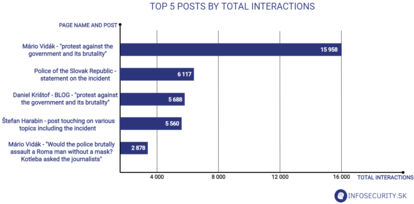Disinformation
Slovak disinformation websites capitalise on the harrowing images of human suffering

Following the example of the Belarusian and Russian state-controlled media, Slovak disinformation websites also capitalise on the harrowing images of human suffering at the EU borders. However, not only the events on the Polish-Belarusian border have been a target of disinformation campaigns. The disinformation actors also tried to justify the illegal annexation of Crimea and the suspicious Russian troop build-up near Ukraine. But the most resonating, as usual, was the topic of the pandemic.
Infosecurity.sk presents an overview of disinformation trends that have been on the rise in the information space in the past two weeks:
- Slovak disinformation actors have repeatedly claimed that the West was to blame for the migrant crisis on the Polish-Belarusian border. Evidence pointing to Lukashenko's involvement in orchestrating the crisis is overlooked, while blame is placed on the EU. The starving and freezing migrants are thus exploited for portraying the EU as an aggressive and immoral institution.
- Disinformation websites has been labeling the deepening of relations between Russia and Belarus a prime example of the myth of "pan-Slavism". This myth is often used by disinformation media to highlight Russia's cultural importance while downplaying Slovakia's Western allies.
- We have seen an increase in Ukraine related disinformation narratives. Local disinformation media are trying to legitimise the illegal annexation of Crimea while justifying the suspicious build-up of the Russian army on the Ukrainian border.
- The disinformation actors were quick to exploit the viral videos of the scuffle between a group protesting against the pandemic measures and the police. The disinformation actors linked the events to the narratives of Covid "apartheid" and "genocide".
Slovak disinformation media exploit the migration situation at the EU borders
The months-long attempts by Alexander Lukashenko's regime to instrumentalise migration on the Belarusian border with Poland, Lithuania, and Latvia for political purposes have recently reached a new alarming dimension.
The Belarusian security forces have been actively involved in organising migration flow, flying migrants from the Middle East to Minsk. From Minsk, they are escorted by uniformed, masked men to the borders with EU countries. The Belarusian regime exploits migrants to provoke conflicts with the Polish security forces by forcibly detaining them in the border zone without any food and water.
According to the EU, this is Lukashenko's way of putting pressure on the Union's borders to retaliate for the harsh sanctions imposed on his regime following a hijacked election and the subsequent crackdown on civil society and independent journalists.
The poor conditions and clashes with Polish security forces are being exploited by the Belorussian as well as the Russian state media, which serves them to present false moral dichotomies. Poland and the EU are consistently portrayed as inhumane and aggressive actors, in contrast, Belarus is presented as a humanitarian one.
The rhetoric spread by the Belarusian and Russian media is also being amplified by local disinformation websites and blogs. The Slovak disinformation actors published several articles and posts portraying the EU as the aggressor in the situation and backed up their claims with statements from various Russian officials. It was often claimed that the West was to be blamed for the crisis, which is supposed to be a direct result of its interference in the Middle East.
However, these are apparent attempts to manipulate the audience and evoke a strong emotional response. Evidence pointing to Lukashenko's involvement in orchestrating the crisis has been overlooked while the blame has been placed on the EU. Hungry and cold migrants are thus exploited to portray the EU as an aggressive and immoral institution.
Russia-Belarus relations as a prime example of pan-Slavism?
The disinformation media hailed the strengthening of relations between Russia and Belarus towards a union state, which includes increased military cooperation, allowing Russia to station its military units on Belarusian territory.
The disinformation websites have long portrayed the deepening relations between Russia and Belarus as a prime example of the idea of "pan-Slavism" - often used by disinformation media to highlight Russia's cultural importance while undermining Slovakia's Western allies.
However, the disinformation websites are once again concealing important facts. In particular, relations between Moscow and Minsk were not always as ideal as they are portrayed. Over the years, in order to maximise his gains, Lukashenko has often balanced politically between the West and Russia, and it was only after the rigged elections which isolated him from the international community that he allied himself mainly with Putin.
Ukraine in the spotlight
Tensions are also rising on the border between Russia and Ukraine. Since the release of information about the increase in presence of Russian forces on the border with Ukraine, and following the U.S. warnings of a possible invasion, we have seen an increase in affiliated disinformation narratives.
The disinformation media repeatedly quoted the statement of Putin's spokesman Dmitry Peskov. Peskov claimed that "the deployment of our military equipment and army units (...) is exclusively our business" and "Russia has never threatened anyone".
The double standard of the disinformation media is clearly observable in this case, as they often portray NATO troop movements within pre-announced exercises on the territory of member states as acts of aggression, but when it comes to suspicious Russian troop movements, it is none of the international community's business.
The familiar disinformation narrative is thus being reused: a weak and aggressive NATO threatens a strong and peaceful Russia, which carries out all its actions purely in defence and without ulterior motives - even if examples from recent history prove the opposite.
As part of the celebration of Russia's national holiday, Unity Day, Putin declared that Crimea will always be a part of Russia, calling the peninsula a symbol of “historical truth” and “reconciliation". This dangerous rhetoric was uncritically picked up and disseminated by the local disinformation media.
The disinformation media has commented on Russia-Ukraine relations in several articles, claiming that relations have stalled since 2014. There is nothing striking about this, but it is noteworthy that the disinformation media cite the 2014 "coup in Ukraine" as the main reason for the deterioration in relations, while completely ignoring Russia's annexation of Crimea and subsequent Russian involvement in the war in eastern Ukraine. Through such omissions, Russia and the local disinformation media are trying to legitimise the illegal annexation of Crimea in the eyes of the Slovak general public.
Anti-vaxxers block supermarkets
In the last few days, anti-vaxxers and anti-pandemic activists have taken their activities to the next level. A group of maskless men blocked shoppers in two supermarkets. At the end of October, they blocked a shop in the Slovak city of Prievidza for three hours while the police stood by powerlessly.
Later, on November 4, a similar scenario was repeated in Lidl shop in the Slovak city of Piešťany. The police officers first asked a group of people to put on their masks. After they refused, they asked them to show their ID cards, which the group also refused.
The policemen then tried to clear the next checkout for other people who could not shop because of the group, which led to a scuffle between the group and the policemen. "Two officers and one man were injured in the incident", the police reported.
The three men were charged with assaulting a police officer and disorderly conduct. The disinformation scene interprets the incident as "police brutality" and a "heinous beating." This portrayal is appearing primarily on Facebook groups or private accounts on which videos of the incident are circulating. Some have begun threatening police officers in response.
The disinformation media was quick to respond to the viral videos of the scuffle, linking the events to narratives of the Covid "apartheid" and "genocide". Some even went as far as to compare the anti-pandemic demonstrators to persecuted Jews in Nazi Germany.
It is precisely such statements appealing to negative emotions that lead to escalated tensions in society; this time resulting in an incident in a supermarket. It is likely that such actions by the police will become more and more inevitable over time, proving that the danger of disinformation is no longer confined only to the online information space.
The data from Crowdtangle[1] confirms that the arrest of the anti-vaxxers in Piešťany was a resonating topic for the disinformation actors on Facebook. 4 out of the 5 top posts in terms of total interactions (likes, comments, and shares) regarding the events come from disinformation media and blogs.
Two of the most resonating were live streams of a protest organised by the far-right Kotleba - People's Party Our Slovakia in response to the incident, which gained more than 200k views and more than 15k interactions. Various anti-vax narratives were spread during the event. Štefan Harabin, a Slovak lawyer, judge, and politician known for spreading conspiracy theories and disinformation, also spoke about the incident, linking it to Covid "apartheid".

The data was obtained by searching for the keyword “Piešťany”.
Project Infosecurity.sk organised by STRATPOL – Strategic Policy Institute and Slovak Security Policy Institute, which is supported by the Prague office of the Friedrich Naumann Foundation for Freedom, continuously monitors the activities of both Slovak and foreign disinformation actors, but focuses mainly on the former. The project activities are built upon daily monitoring of emerging disinformation, hoaxes, and conspiracy theories in the online information space. This approach allows the analysts to identify disinformation posts and narratives that resonated with the public the most, as well as to find out where they originated, and how they spread and evolved on social media. The report takes the form of a bi-weekly summary of arising trends in the spread of malicious information content online. Based on that, Infosecurity.sk can warn the public about emerging and current trends in the field of disinformation, manipulation, and propaganda.
[1] CrowdTangle is a monitoring tool made available by Facebook to help monitor, analyse, and report on what’s happening across the platform. https://www.crowdtangle.com
Matej Spišák is a Research Fellow at STRATPOL – Strategic Policy Institute in Bratislava and Editor-in-Chief at Infosecurity.sk.
Denis Takács is an Analyst at STRATPOL – Strategic Policy Institute in Bratislava.

